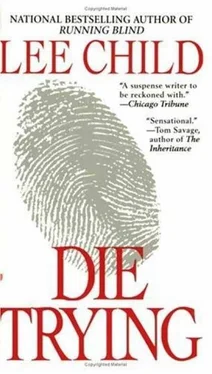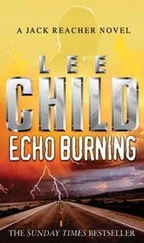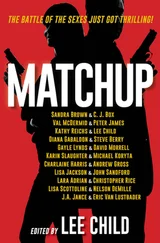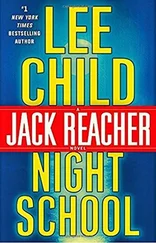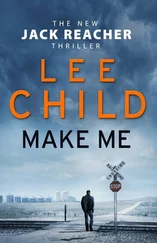“We normally do this in the woods,” the unit leader said. “We normally do it vertically, with trees.”
Then the guy pointed upward at the sky.
“But we need to let them see,” he said. “They can’t see properly in the woods. This time of year, too many leaves in the way, right?”
The guard who had driven the tent pegs into the ground was panting from the exertion. He changed places with his leader again. Jammed his rifle into McGrath’s gut and leaned on it, recovering. McGrath gasped and squirmed under the pressure. The leader squatted down and sorted through the ropes. Untangled one and caught McGrath by the ankle. Looped the rope around and tied it off, hard. Used the rope to drag McGrath by the leg into the approximate center of the square. Then he tied the loose end to the fourth peg. Tied it tight and tested it.
The second length of rope went around McGrath’s other ankle. It was tied off to the third peg. McGrath’s legs were forced apart at a right angle. His hands were still cuffed behind his back, crushed against the rocky ground. The leader used the sole of his boot to roll McGrath’s upper body sideways. Ducked down and unlocked the cuff. Caught a wrist and looped a rope around. Tied it tight and hauled the wrist up to the second peg. He pulled on it until McGrath’s arm was stretched tight, in a perfect straight line with the opposite leg. Then he tied it tight to the peg and reached down for the other wrist. The soldiers jammed their muzzles in tighter. McGrath stared up at the vapor trails and gasped in pain as his arm was stretched tight and he was tied into a perfect cross.
The two soldiers jerked their rifles away and stepped back. They stood with their leader. Gazing down. McGrath lifted his head and looked wildly around. Pulled on the ropes, and then realized he was only pulling the knots tighter. The three men stepped farther back and glanced up at the sky. McGrath realized they were making sure the cameras got an uninterrupted view.
THE CAMERAS WERE getting an uninterrupted view. Seven miles in the sky, the pilots were flying circles, one on a tight radius of a few miles, the other outside him on a wider path. Their cameras were trained downward, under the relentless control of their computers. The inside plane was focusing tight on the clearing where McGrath was spread-eagled. The outer camera was zoomed wider, taking in the whole of the area from the courthouse in the south to the abandoned mines in the north. Their real-time video signals were bouncing down more or less vertically to the dish vehicle parked behind the mobile command post. The dish was focusing the datastream and feeding it through the thick armored cable into the observation truck. Then the decoding computers were feeding the large color monitors. Their phosphor screens were displaying the appalling truth. General Johnson and his aide and Webster were motionless in front of them. Motionless, silent, staring. Video recorders were whirring away, dispassionately recording every second’s activity taking place six miles to the north. The whole vehicle was humming with faint electronic energy. But it was as silent as a tomb.
“Can you zoom in?” Webster asked quietly. “On McGrath?”
The General’s aide twisted a black rubber knob. Stared at the screen. He zoomed in until the individual pixels in the picture began to clump together and distort. Then he backed off a fraction.
“Close as we can get,” he said.
It was close enough. McGrath’s spread-eagled figure just about filled the screens. The unit leader could be seen from directly above, stepping over the lengths of rope as he circled. He had a knife in his hand. A black handle, a shiny blade, maybe ten inches long. It looked like a big kitchen knife. The sort of thing a gourmet cook might buy. Useful for slicing a tough cut of steak into strips. The sort of tool that would get set out on the kitchen counter by someone making a stew or a stroganoff.
They saw the guy lay the knife flat on McGrath’s chest. Then he used both hands to fold back the flaps on McGrath’s jacket. He loosened McGrath’s tie and pulled it sideways, almost up under his ear. Then he grasped the shirt and tore it open. The cotton pulled apart under the knife, leaving the knife where it was, now next to the skin. The guy pulled the tails out of the waistband and tucked the shirt right back to the sides. Carefully, well out of the way, like he was a surgeon faced with a difficult emergency procedure.
They saw the guy pick up the knife again. He was squatted down to McGrath’s right, leaning over slightly, holding the knife. He was holding it point down, close to McGrath’s belly. The electronic pink of McGrath’s skin was reflected in the faces of the watchers inside the observation vehicle.
They saw the guy raise the knife an inch. They saw his index finger slide along the back of the blade, like he was adjusting his grip for extra precision. They saw the blade move down. The pale sun glinted on the steel. Then their view was disrupted. A silent puff of pink mist obscured the picture. When it cleared, the knife was still in the guy’s hand. But the guy had no head. His whole head was a shattered pink wound, and he was toppling slowly sideways.
THE LEFT-HAND GUARD went down easily enough, too. Reacher put a bullet through the side of his head, just above the ear, and he fell heavily, right on top of the spread-eagled Bureau guy. But the right-hand guard reacted. He spun away and hurdled the taut ropes, racing for the trees. Reacher paused a beat and dropped him ten feet away. The guy sprawled and slid noisily through the shale and put up a slick of dust. Twitched once and died.
Then Reacher waited. The last staccato echo of the three shots came back off the farthest mountains and faded into quiet. Reacher watched the trees, all around the Bastion. Watched for movement. The sunlight was bright. Too bright to be sure. There was a lot of contrast between the brightness of the clearing and the dark of the forest. So he waited.
Then he came out from behind the radio hut at a desperate run. He sprinted straight across the clearing to the mess in the middle. Hauled the bodies out of the way. The guard was sprawled right on top of the Bureau guy. The unit leader was across his legs. He dumped them out of the way and found the knife. Sawed through the four coarse ropes. Dragged the Bureau guy upright and pushed him off back the way he’d come. Then he grabbed the two nearest rifles and sprinted after him. Caught him up halfway. The guy was just tottering along. So Reacher caught him under the arms and bundled him to safety. Threw him well into the trees behind the huts and stood bent over, panting. Then he took the magazines off the new rifles and put one in his pocket and one on his own gun. They were both the elongated thirty-shot versions. He’d been down to six rounds. Now he had sixty. A tenfold increase. And he had another pair of hands.
“Are you Brogan?” he asked. “Or McGrath?”
The guy answered stiffly and neutrally. There was fear and panic and confusion in his face.
“McGrath,” he said. “FBI.”
Reacher nodded. The guy was shaken up, but he was an ally. He took Fowler’s Glock out of his pocket and held it out to him, butt first. McGrath was panting quietly and glancing wildly toward the deep cover of the trees. There was aggression in his stance. His hands were balled into fists.
“What?” Reacher asked him, concerned.
McGrath darted forward and snatched the Glock and stepped back. Raised it and went into a shooting stance and pointed it two-handed. At Reacher’s head. The cut ends of the ropes trailed down from his wrists. Reacher just stared blankly at him.
“Hell are you doing?” he asked.
“You’re one of them,” McGrath said back. “Drop the rifle, OK?”
Читать дальше
